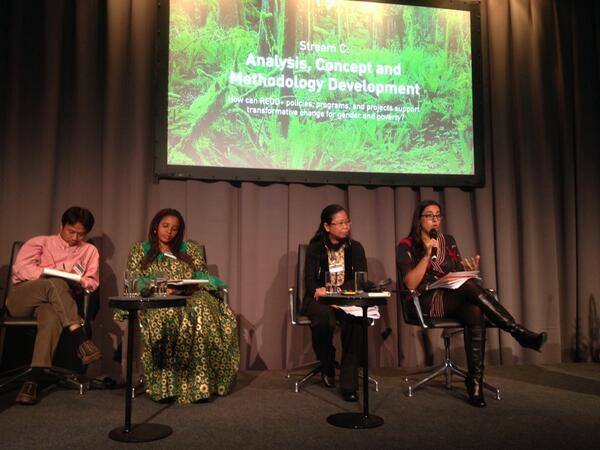OSLO (October 30, 2013) – More than 450 experts were gathered in Norway on October 29-30 for the Oslo REDD Exchange Conference, to discuss the constraints to and opportunities for successful establishment and implementation of REDD+ (Reducing Emissions from Deforestation and Forest Degradation in Developing Countries). REDD+ has been on the international policy arena for 6 years, but there are still many challenges to overcome before it becomes truly effective.
One such challenge is how to design REDD+ programmes so that they support transformative change for gender equality and poverty. Attending the conference, WEDO’s expert on gender and forests, Andrea Quesada, participated in a panel discussion on the topic. She was joined by Ahmad Kusworo from Fauna & Flora International (FFI) Indonesia, Matilda Walimbe from Environmental Protection and Development Association (EPDA Cameroon) and Esterluna Canoy Kitanglad Integrated NGOs (KIN) from the Philippines. Isilda Nhantumbo fromInternational Institute for Environment and Development (IIED) moderated the discussion.
– Few people in this room would say gender is not important when asked. However, when it comes to actions, gender tends to be placed in the backseat and considered a light topic, Andrea said opening her speech. She explained how WEDO has not only done concept analysis of why gender is important, but worked to provide the know-how on gender that can be found in the recent WEDO publication “Getting Gender Right in the REDD+ Social and Environmental Standards”.
Andrea said there was a need for the step-wise process described in the publication, but that it is also important to consider the national and local context and encourage practitioners to use, adapt and prioritize this innovative tool. She stressed the need for capacity building of staff to understand how to address gender in a practical way from the beginning of a REDD+ project, and how this should be done in a comprehensive process that focuses on enabling conditions, strategic planning and implementation of actions at a project level.
– If we want REDD+ to become an important development initiative in our countries, we need to have gender at the forefront, Andrea stated.
The discussion generated several question from the audience, most of them working on REDD+ themselves.
– In our projects we have found that the men accept the participation of women because of pressure from the project developers but not because they think women should have more influence in decision making. How do we get to more practical action and see real impacts on the lives of indigenous women?, a participant from Guatemala asked.
Gro Lindstad from FOKUS, said that we should be critical of how gender has been dealt with in REDD+ programmes and projects so far, and ask ourselves if gender mainstreaming is the most effective strategy or if gender issues should be addressed separately.
Andrea gave recognition to the critical questions coming from the audience, and said that when REDD+ was proposed for the first time in 2005, the concern of women’s groups was that the forest sector had traditionally been gender blind.
– But we also saw it as a possibility, because this initiative would be designed from the beginning and could be window for us to uncover and highlight gender considerations. Gender equality is not a reality around the world and we have to use every initiative we can to change paradigms, she concluded.
Watch the whole panel discussion here.
See here for a good summary on recent initiatives on gender and REDD+.



